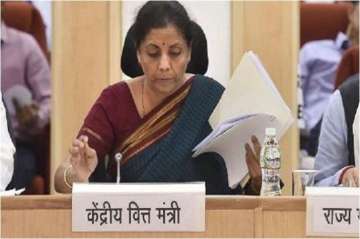The corporate tax cuts will have limited impact on growth and inflation, though the move will expose the economy to fiscal slippage risks, according to experts.
According to global rating agency Moody's, the reduction in corporate income tax revenue – even when balanced against the windfall from the recent transfer of central bank surplus reserves, equivalent to around 0.3 per cent of GDP in the current fiscal year – further narrows fiscal room for manoeuvre.
However, it described the rate reduction as credit positive for companies because it will enable them to generate higher post-tax incomes.
Among Moody's rated non-financial companies in India, commodity and information technology (IT) services companies will benefit most from the tax rate cut.
The government on Friday slashed the income tax rate for companies by almost 10 percentage points to 25.17 per cent and offered a lower rate to 17.01 per cent for new manufacturing firms to boost economic growth rate from a six-year low by incentivising investments to help create jobs.
In aggregate, rated non-financial companies in India reported a total pre-tax net income of about USD 35 billion for the fiscal year ended March 2019, Moody's said, adding, assuming the earnings of these companies remain unchanged for fiscal 2019, they will save about USD 3 billion from the tax rate reduction.
"The central government deficit target of 3.3 per cent of GDP in fiscal 2019 already assumes faster economic growth and higher tax buoyancy than we expect...We do not expect the corporate tax rate cut to revive growth such that stronger tax buoyancy compensates for the loss in revenue," it said.
According to Nomura, the fiscal deficit during the current fiscal may swell to 3.6 per cent of the GDP due to revenue shortfall arising from the reduction in corporate tax.
"Taking into account the likely fiscal hit from these announcements, the current tax shortfall due to weak nominal GDP growth, higher RBI dividends and potentially large expenditure savings, we estimate the net potential fiscal slip may amount to Rs 600-700bn, that is 0.3 per cent of GDP in FY20 (versus the budgeted target of 3.3 per cent of GDP)," Nomura said in a report.
"We don’t expect lower corporate taxes to have any meaningful near-term growth impact as they will boost corporate profits and sentiment, but are unlikely to trigger investment given global uncertainties and balance sheet headwinds. However, this is a medium-term positive step," it said.
With no meaningful growth impulse, there may not be any inflationary impact.
"Given the Reserve Bank of India’s (RBI) inflation mandate, below-target inflation and a larger-than-expected negative output gap, we still expect a cumulative 40 basis points repo rate cut in Q4 2019, with a high possibility of a front-loaded easing in October itself," it said.
At the margin, though, with fiscal policy now doing some of the growth heavy lifting, the need for more aggressive monetary policy easing, particularly lowering the repo rate below 5 per cent, becomes less necessary.
Latest Business News

